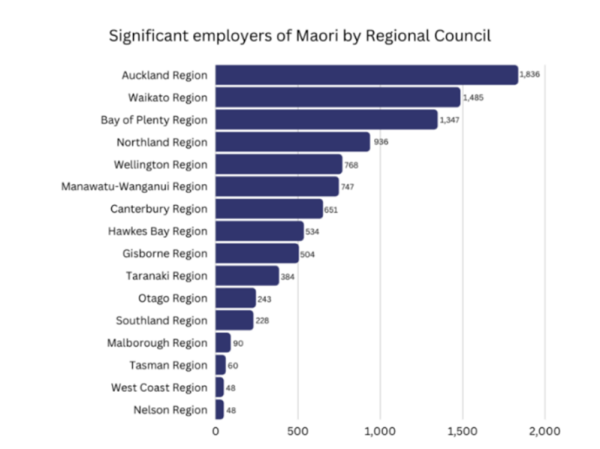Māori business
This section looks at Māori business impacts in the Bay of Plenty labour market.
On this page
Key insights
Māori employers and businesses provide employment for Māori workers.
While “fishing, farming, and forestry” still dominate in terms of revenue, Māori businesses have diversified dramatically in the past two decades to include film, fashion, food, and a range of other enterprises across industries [15]. Construction has also been identified as a significant employer of Māori in the Bay of Plenty.
The region is the third highest employer across the motu (behind Auckland and Waikato) with 1,347 individual employers in 2020 (figure 2)[16] representing around 12% of all regional employers. Given the upward trajectory of the Māori economy, it makes sense to move alongside this growth and look to build greater capability for Māori businesses.
Figure 2: Significant employers of Māori by Regional Council

Text description of Figure 2: Significant employers of Māori by Regional Council
Our approach
Over the past year the Regional Skills Leadership Group (RSLG) formed several partnerships throughout the region with community-based providers such as the Manawa Work for Life Centre and the Rotorua Youth Centre.
These partnerships were established to build overall understanding and a knowledge base around workforce resilience, particularly for rangatahi, with the longer-term plan of sharing this knowledge regionally to facilitate [17] improvement in industry knowledge about how to support Māori workers (including examples and case studies of good practices from across the region) [18]. However, while this work has provided useful insights and information on approaches to support Māori youth and workers, the conversations also highlighted that Māori businesses need support as well.
“Māori-owned businesses are important in employing a large proportion of the Māori population. Employment is a meaningful part of belonging to society and contributes to whānau thriving as well as wellbeing [19]."
One clear path to supporting Māori businesses is by looking more closely into social procurement to assess whether current approaches work for Māori. Deloitte identified the following in 2020:
“In addition to increasing the number of jobs for Māori people, an indigenous procurement policy might also create a Māori employment updraft, helping Māori to attain more highly paid and senior roles in the job market. Social procurement would also naturally support the development of Māori businesses as more targeted opportunities arise to tender for government contracts [20].”
The key reason the RSLG wants to focus on social procurement is not due to the lack of procurement pipelines for Māori businesses, but due to the challenges around these businesses accessing pipelines, in particular the procedural requirements to avail themselves of said opportunities. The RSLG wants to focus on options to improve capability and what options exist to streamline processes.
The RSLG knows there is already good work underway in the region regarding this mahi and intends to leverage the expertise of agencies that are already engaged with Māori businesses, such as Te Puni Kōkiri, Amotai and others who have a background working with Māori businesses and understand the nuances of working with them and the issues they face around social procurement. The Group is delighted for instance to see events like the “Meet the buyers” event sponsored by Priority One and Amotai in March this year [21].
Progressive Procurement(external link) — Te Puni Kōkiri
About Amotai(external link) — Amotai
Key Regional Workforce Plan aspirations and actions that relate to Māori business
Resilience aspiration
Enable workforce resilience across individuals, communities, and industries by partnering with and coordinating between:
- Iwi/hapū
- industry groups
- employers
- government agencies.
Resilience action
Co-ordinate between those who provide support to Māori workers in the community and the employers who recruit them to find ways to improve workforce resilience (for example, through sharing good employer models of pastoral care, transition planning and support for their workforce).
New Recommendation
As part of the resilience action noted above the RSLG will work to gain a clearer understanding of how social procurement is positively impacting Māori businesses and identify options to improve and streamline support for Māori employers in this regard.
“The Government’s new 5% target for the number of public service contracts awarded to Māori businesses is a great start. To achieve its full potential will require deliberate action to build capability on both sides of the procurement equation. This means providing culturally appropriate support to Māori businesses to participate in government procurement, as well as training staff in procuring agencies.[22]”
[15] Maori businesses have multiple aspirations(external link) — Newsroom, 21 February 2022
[16] Te Matapaeroa 2020 [PDF, 502KB](external link) — Te Puni Kōkiri
[17] Resilience
[18] Resilience
[19] Te Matapaeroa 2020(external link) — Te Puni Kōkiri, 21 February 2022
[20] How social procurement can address inequities in Aotearoa(external link) — Deloitte
[21] Insights from Māori frontier firms [PDF, 186KB](external link) — Cut to the Chase, April 2021
[22] Empowering Māori and Pasifiks Businesses: Driving Regional Development(external link) — Priority One

